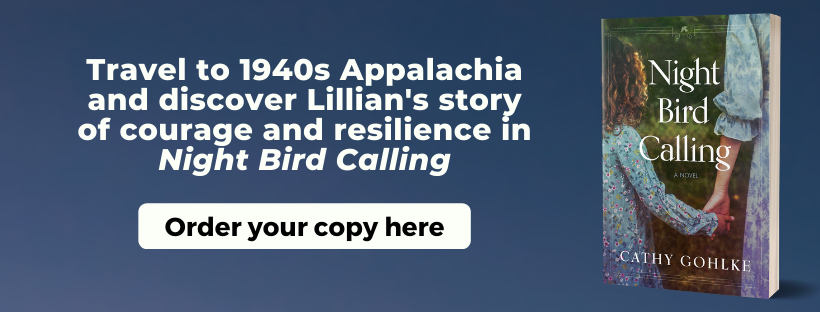
Night Bird Calling by Cathy Gohlke tells the story of Lilliana Swope who flees her abusive husband for the home of her great-aunt in No Creek, North Carolina, With war brewing for the nation and for her newfound community, Lilliana must overcome a hard truth voiced by her young friend Celia: Wishing comes easy. Change don’t. In this Q&A with Cathy, learn about her research for the novel and what she hopes readers will take away from the novel.
Q. What inspired you to write Night Bird Calling?
Years ago I wrote a number of short stories based on some quirky characters in a fictional North Carolina foothills town called No Creek. I loved those characters, but in order to create a novel I needed an outside character who could see both strengths and foibles in my town folk and still care about them, still want to become part of their community, and who could tie their stories together.
For many years I’ve also wrestled with the idea of writing about the racial divide and abuse I saw growing up during years of the civil rights movement in the South, as well as domestic abuse and church oppression, things I experienced in my youth and young womanhood. Night Bird Calling is the marriage of all those experiences and stories.
Q. Can you tell us about the historical research that went into writing this novel? Did you learn anything new that surprised you?
Much of my prior WWII writing has focused on foreign shores, but for this story I researched the American home front before and during WWII through books, Internet research, archival film footage on the Great Depression, Jim Crow laws and their results, the history of lynching and the KKK, racism and the great migration, and the work of Eleanor Roosevelt, as well as histories of Wilkes and Surry Counties in North Carolina and the Appalachian home moonshine industry and its culture. I read about and visited lifesaving stations on the Outer Banks.
Legal sources were interviewed for information regarding trusts, wills, and divorce proceedings in 1941. Newspapers archives for Wilkes County were helpful. I interviewed some wonderful older people who had lived there during those years and pulled some real-life stories from them, my family, and my own life, then enjoyed a trip to the North Carolina foothills and mountains, soaking up its music and a visit to the church and cemetery where some of my ancestors were buried. For the Oswald and Biddy Chambers threads, I found wonderful information in the biography Mrs. Oswald Chambers by Michelle Ule and in Oswald Chambers: Abandoned to God by David McCasland, as well as pertinent passages in My Utmost for His Highest.
I was surprised to learn how close to civilian life the military in North Carolina practiced war games as they trained recruits. I can only imagine it was startling and perhaps frightening to those able to observe.
Q. Stories of racial division and wartime highlight the difficulty of living in uncertainty and dealing with the unexpected. How does faith play into this aspect of the novel and into the novel more generally?
None of us know the future. We don’t control the present. Life—our own and the community and nation in which we live—can turn on a dime. We all need a source, a touchstone, a safe place that also presents a moral lens and a high, stable bar. Jesus Christ and faith in His unfailing love and provision fills all those needs. Lilliana, Celia, Gladys, the McHones, and others to a lesser extent all learn this lesson and grow from it.
Q. What did you learn by writing this novel, and what lessons do you hope your readers take away?
Night Bird Calling is fiction, as are its characters, though parts of Lilliana’s escape from an abusive marriage and her challenged growth into believing that God really loves her and has a plan for her life were drawn from my own life. I found the dredging up of memories I’ve wanted to forget and the necessary baring of my soul to write this story emotionally challenging, yet in the end I also found it freeing. Shame loses its hold once confessed. It is truly a gift if that confession helps free others. Abused women are often told not to tell of their abuse and are threatened with dire consequences to ensure their silence. Often they are filled with shame that they cannot stop the abuse, cannot change their abuser, and feel helpless to change themselves or their circumstances. They believe their situations are unique, that no one will believe them, that they are truly alone. I hope that in writing Lilliana’s story, other women will realize those things are not true, and that abuse does not come from God, no matter what their abuser or oppressor insists. I hope women realize their value lies in the very life God has given them and that He is above all the Husband who never fails us.


